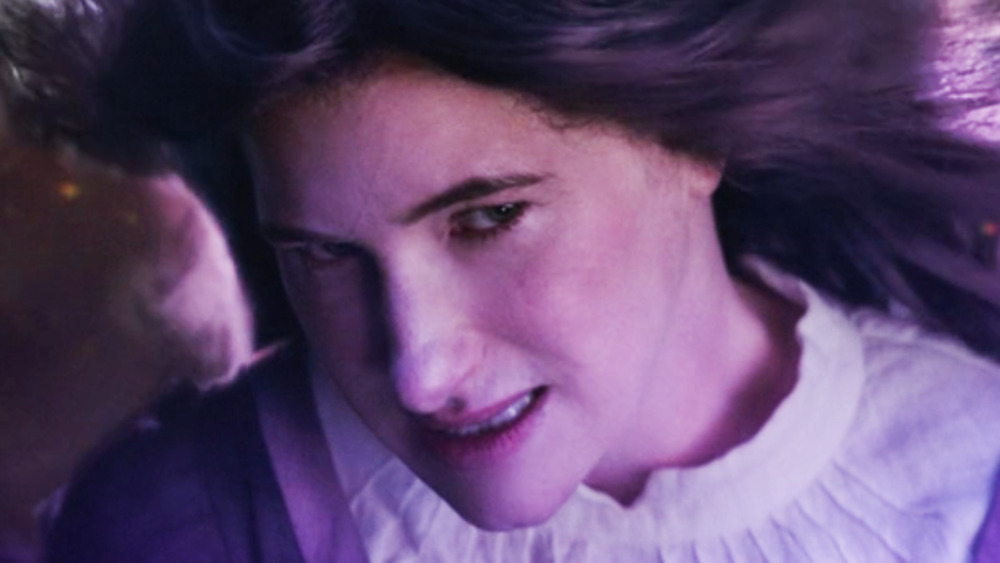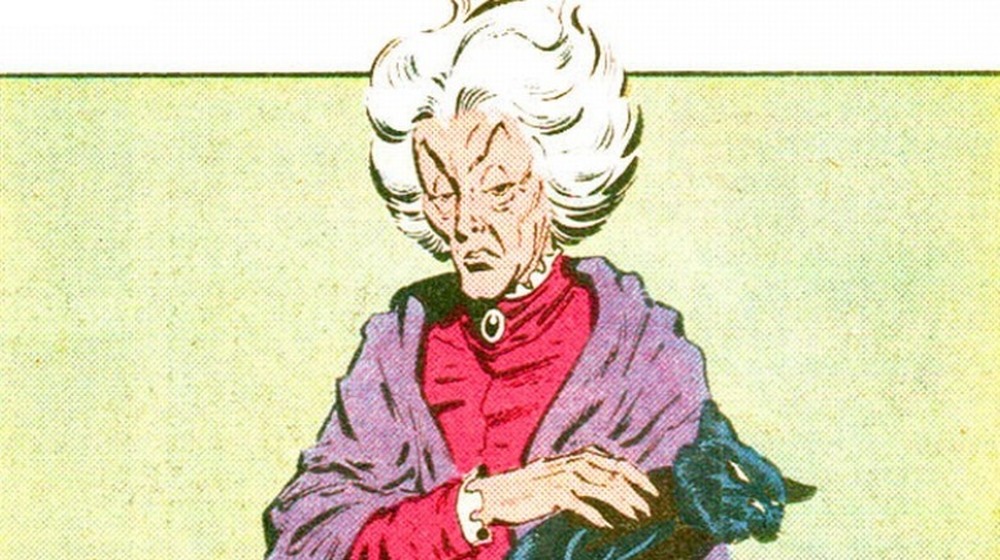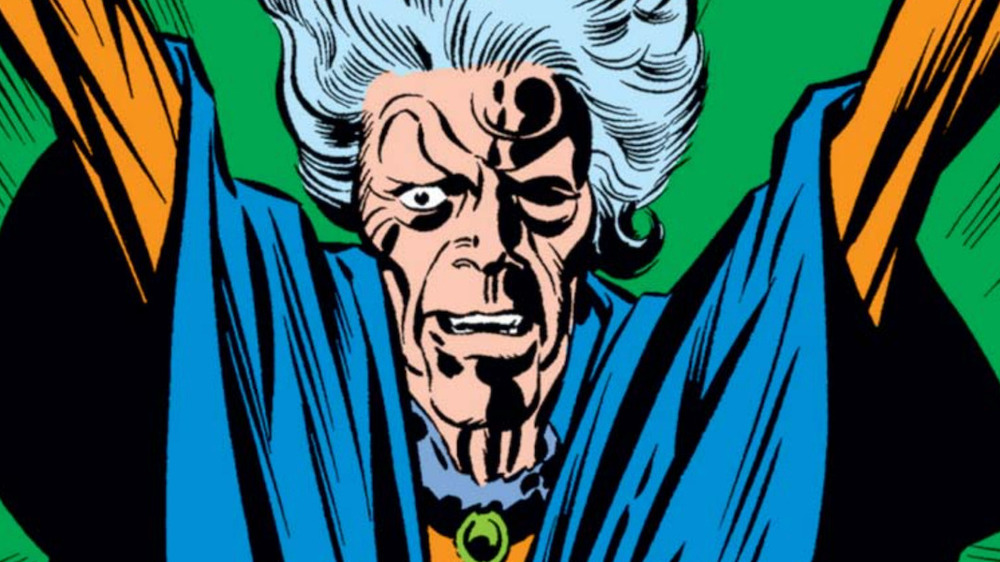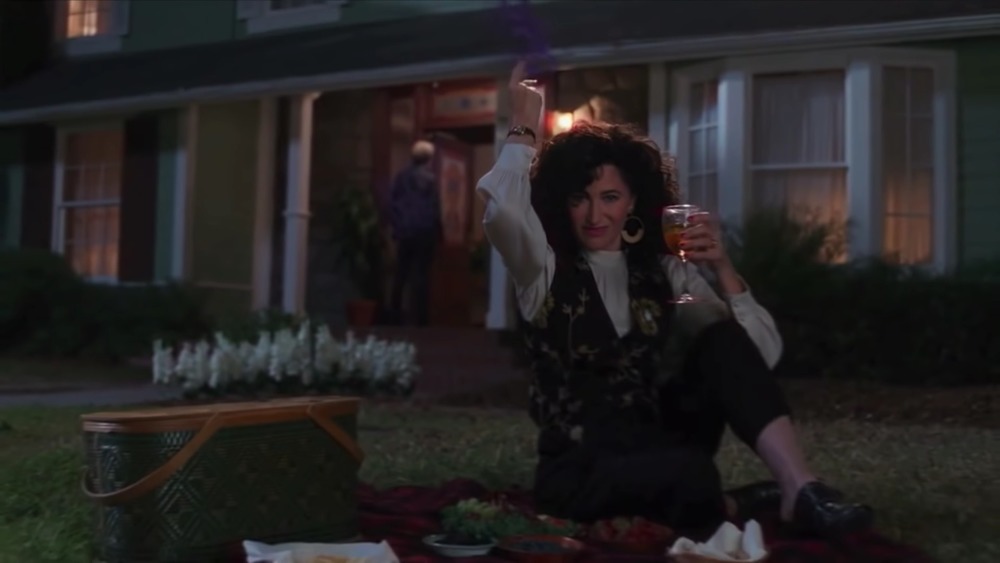Why Is Agatha Harkness So Powerful?
Who's been messing up everything? It's been Agatha all along. Who's been pulling every evil string? It's been Agatha all along. That's what Agatha Harkness' WandaVision theme song wants us to believe, and given recent events, um... we do. In fact, Harkness is so insidious, she trained audiences to love her theme song via Pavlovian conditioning, which made every episode's opening follow the same musical motif. Now that's evil.
While Harkness' not-so-surprise reveal on WandaVision finally confirmed a long-standing theory — and explained occurrences such as Pietro Maximoff's reality recast — it also left a burning question. What are the limits and origins of Harkness' power? Granted, we will probably learn about these eventually, but who has time to wait? Isn't reading about comic book character's fictional origins what the internet is really for? Let's look at everything we know so far about Agatha Harkness, both in the show and her comic book appearances, to try to answer the query ourselves.
Agatha Harkness' powers in the Marvel comics
In Marvel comics proper, Agatha Harkness is an old woman. An old, old woman. She's got memories stretching back 500 years before Atlantis sank, which Marvel's in-universe historians place around 10,500 BC. Basically, Harkness predates every known human civilization, and she's outlasted all of them. You know what they say: with age comes wisdom. And since wisdom is power for the magically inclined, essentially Harkness is powerful because of her age, but that's only part of the equation. She draws from three sources of magical power: her own personal well of energy, ambient magic that pervades the Marvel universe, and extra-dimensional energy that exists in entities and objects housed in tangential dimensions. These three sources give Harkness a near limitless source of power — but we're still not done.
In the Marvel universe, witches and warlocks rely on the Goddess of Witchcraft — even the Sorcerer Supreme is powerless without her. At one point in Marvel canon, the goddess was, for lack of a better term, killed by another supreme deity, Chaos. When Wanda Maximoff and the ghosts of her mother and Harkness resurrected the Goddess of Witchcraft, that act also resurrected Harkness herself. This could imply some special link between her and the goddess that goes far beyond what normal spell-casters experience, which could explain her power.
But there's an important point to consider about the Marvel Comics version of Agatha Harkness.
Agatha Harkness is not inherently evil in Marvel Comics
One crucial detail when considering Agatha Harkness through the lens of Marvel Comics: she's not a villain. Stay with us here.
It's true that witchcraft is traditionally associated with darkness. Those who deal in the macabre are typically considered evil; it's why the Salem Witch Trials were a real thing. But Marvel Comics makes it clear Harkness is anything but a baddie. "Agatha Harkness may be a lot of things, but inherently evil is not one of them," Stephanie Williams writes for Marvel. "Sure, she does things that may make you raise an eyebrow (or at first glance project villainous energy), but upon taking an in-depth look, it's not that black and white."
Not convinced? Consider this: Reed and Susan Richards of the Fantastic Four — Marvel Comics' answer to the first family — hired Agatha Harkness as a nanny. In 1970's Fantastic Four No. 94, they enlisted her to watch over their newborn son, Franklin Richards, and she was more than up to the task of defending the powerful infant from the Frightful Four. On the other hand, Harkness did also kind of kidnap Franklin a few years later in Fantastic Four No. 185, but she needed his help to take down the despotic ruler of the New Salem magic community and she didn't really have time to ask for permission.
Of course, the as-seen-on-TV version of Agatha Harkness has definitely been cast in a villainous light so far.
Agatha Harkness's powers on WandaVision
While most of Agatha Harkness' comic history is unaccounted for — there's a huge gap between 10,500 BC and the 1600s — it's implied that she's always been powerful. After all, she led the Salem witch coven before, during, and after the Salem Witch Trials. Conversely, the Marvel Cinematic Universe's Harkness had to struggle a bit for her powers, which came at a huge cost. During a flashback scene, WandaVision reveals that the MCU Harkness wasn't in charge of the Salem coven; her mother held that position. But even being the boss-witch's daughter didn't immunize Harkness from being charged with essentially stealing knowledge beyond her age and station and practicing "the darkest of magic." These crimes were punishable by death. Unfortunately, whatever Harkness did granted her powers she couldn't quite control, including the ability to seemingly reflect spells back at her executioners with fatal results.
This "darkest of magic" is clearly the source of Harkness' strength in WandaVision, but the magic's origin remains a mystery for now. Some WandaVision fan theories revolve around the Satan-stand-in Mephisto, so could he serve as Harkness' vile patron and the cradle of her abilities? If the "Agnes was Agatha all along" theory proved true, anything is possible.



